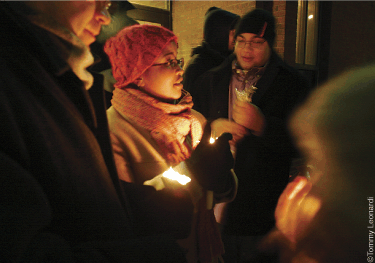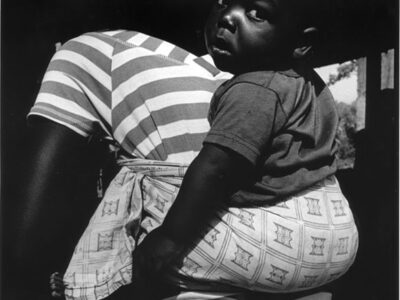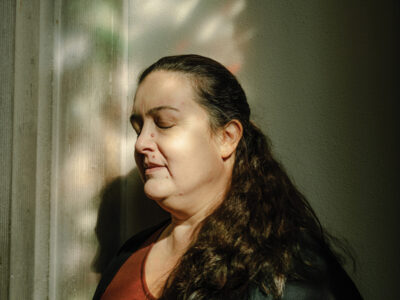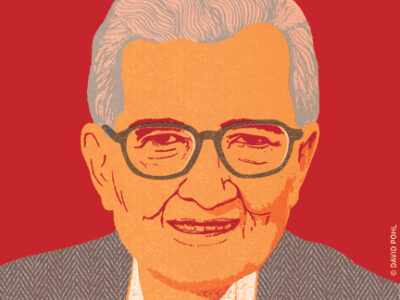
Martin Luther King Day at Penn.
MLK Symposium | “If black women and gay men didn’t go to church,” quipped Dr. Mary Frances Berry, “the churches would close.” Her remarks came after Dr. Angela Davis had delivered a sharp critique of what she sees as a national obsession over gay marriage in the Rev. Martin Luther King Jr. Lecture in Social Justice, which this year focused on the intersection between social justice and sexuality. “Civil rights belong to everyone,” Davis asserted, and also wondered of marriage, why it is that “people suddenly forget all that they have learned and suggest that [it] is an ideal institution?”
The annual lecture, part of a series of campus events celebrating King’s life and legacy, brought together two women who have been central to, and deeply active in, civil and human rights struggles. Angela Davis, professor of the history of consciousness at UC-Santa Cruz and University of California Presidential Chair in African American and Feminist Studies, joined Berry, the Geraldine R. Segal Professor of American Social Thought and professor of history at Penn and former chair of the U.S. Commission on Civil Rights, for a no-punches-pulled conversation in Irvine Auditorium on January 21.
Moderated by Dr. Tukufu Zuberi, professor of sociology and director of the Center for Africana Studies, their discussion ranged widely, from slavery’s racist and sexually exploitative methods to the sexualizing of prisoners by guards at Abu-Ghraib into a victim-conqueror relationship to worries over a more conservative and divided America, and finally to how King’s example and philosophy can be applied to present and future human-rights challenges.
Zuberi opened the discussion by asking, “What do we mean by social justice and its relationship to sexuality?”
According to Davis, “Sexuality has played a major role in shaping racism in our country. [For] Black people, in this country—from the days of slavery, when it was a custom of subordinating sexuality to procreate people for the purpose of reproducing the slave population—one of the major moments of freedom was precisely the freedom to make decisions about the person with whom one would be involved in an intimate, sexual relationship. So, I think that it is important that we link these contemporary debates about sexuality—heterosexuality, homosexuality—to the sociohistorical role of sexuality shaping race, and in particular, shaping racism.”
Berry reinforced Davis’ perspective, adding that “People have been defined by their sexuality, based on both class and race [limiting] what you could or could not do, so, connections between justice and opportunity and being able to actualize yourself and your own agency across the board gets its keenest and highest manifestation in the control and exercise over sexuality. And we’re still struggling with that today.”
A recurring theme in the evening’s discussion was the connection between sexuality and moral values as promoted by the Bush administration.
Berry’s quip about churches closing reflected her deeper concerns about how the current administration uses moral issues and isolates causes from their larger social fabric. During the election season, Berry recalled, she visited several black churches where the congregations were largely voting for Bush because of his stance opposing same-sex marriage and abortion. She would ask the congregation if anyone there was a part of, or knew anyone in, a same-sex marriage. They all claimed they did not. She then asked if anyone had someone in jail, knew someone who needed healthcare, or knew a person with AIDS, and many people affirmed these realities in their lives. “So,” she concluded, “you are mobilizing to go out to the polls and vote [for Bush], and you don’t know anybody in a same-sex marriage?!”
Similarly, Davis raised her concern over all the attention given to the one issue of same-sex marriage when it detracts from the fact that everyone should have the full extent of civil rights. She also wondered why no one critiques the institution of marriage and the role it plays in “reproducing the system of capitalism,” listing the top three reasons people get married: to procreate, to socialize individuals, and to receive tax deductions.
The Bush administration’s war on terror also came in for attack. “If you want to talk about racism, racism is very severely linked up with the rhetoric and the discourse on terrorism that is now the pretext for waging war on the world,” Davis said.
Zuberi was quick to ask what place King’s philosophy of nonviolence has “in a post-9/11 world, in a world where America is on orange alert, in a world where al-Qaida exists, where there are nuclear threats, where the Patriot Act is in full effect, and where we have Guantánamo Bay? What can we learn from Dr. King’s nonviolence philosophy, and is there anything about these things that are even related to a discussion of sexuality and social justice?”
Berry saw the main connection rooted in the reasons people give for going forward with wars on terror, and for the positions they take on sexuality: both stem from moralexplanations. “The rationale for taking certain positions on sexuality is moral,” she said. “The whole idea of the war is raised [by Bush] in terms of morality.”
She then emphasized that King’s nonviolence stance “is a very effective way to make social changes … The argument that you don’t really solve problems by making war, I think that has just as much potency, and makes just as much sense now, since 9/11, as it made before 9/11.”
Asked how to prioritize tackling injustice, Davis urged focusing on those issues that resonate the most with each person, and to not feel the need to spread oneself thin by taking up all causes. “One can’t accomplish everything simultaneously, but it is, I think, about the framework within which one engages in the struggles one is involved in,” she said. “It’s not so much a question of deciding what is the most important. It’s a question of understanding
the connections.”
For example, offered Berry, “AIDS is related to sexuality. It’s obvious that poverty, sexuality, and AIDS [are related] … You cannot deal with one of them without thinking about the others.”
—Beebe Bahrami Gr’95




